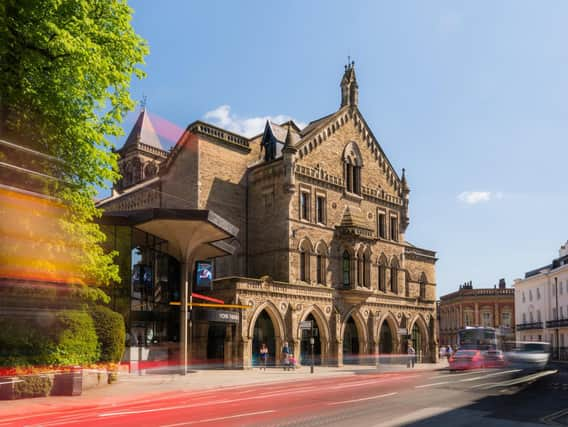The intriguing history of theatre inside York city walls


Today on my journey around the county’s theatres I arrive in York, an ancient proud city with a theatre that has perhaps the most intriguing history of all our playhouses.
There has been a theatre standing on the site since 1744. York Theatre Royal kept going through the wars, but it hasn’t been able to resist the relentless Coronavirus. Indeed, it was York where the UK’s first case of the virus was confirmed on January 29, or a different lifetime ago.
Advertisement
Hide AdAdvertisement
Hide AdClosing down the theatre without knowing when the lights will go back on for the first time in its history must have been a dizzying prospect for executive director Tom Bird who is still a relatively ‘new man’ in the job (he took over in August 2017, replacing outgoing chief executive Liz Wilson. Artistic director Damian Cruden, who left in February 2019, hasn’t been replaced).
When I spoke to Bird for The Yorkshire Post when he first arrived in post, he told me: “It’s a theatre with history, there aren’t many places where you walk past an 18th century gateway backstage.”
Bird came to York from Shakespeare’s Globe where he had served as executive producer from 2012. Why was he attracted to York? “It’s a fascinating, complicated and beautiful city. The theatre’s community ethos felt really genuine and the staff were friendly and ambitious,” he says.
It is a theatre that attempts to put the community at its heart, involving local people in productions as often as possible. I remember in 2012 taking a trip around the city with Liam Evans Ford, who at the time was at the helm of a production of the York Mystery Plays. It was a trip around the city because the space to house the 1,500 volunteers who were making this production a reality couldn’t be found in a single place.
Advertisement
Hide AdAdvertisement
Hide AdWalking around that day, it was extraordinary how the theatre felt woven into the fabric of the place. Volunteers would shout a hello to other volunteers across the street. I saw it again with The Railway Children when that epic show set up shop, as a York Theatre Royal Production, in the city’s National Railway Museum.
York has its theatre somehow deep within its DNA. Bird says: “The city defines the theatre. Whatever the people of York want the theatre to be, we have to be. Perhaps what defines us is that we have that view and we are brave in always trying to follow it.”
That’s the other really key thing I have always experienced at York Theatre Royal: brave choices. It’s interesting that in the main theatre, which has a lot of seats to fill, the choices can sometimes be obvious – classics, texts that are on the syllabus – but in the studio you will find some of the region’s most radical work finding a home.
Bird says young people are a vital element of the theatre: “We have one of the biggest and busiest youth theatres in the world, we’re missing that a lot.”
Advertisement
Hide AdAdvertisement
Hide AdDuring the Coronavirus pandemic, the theatre is making sure it’s useful, co-ordinating volunteers who are making gowns and scrubs for the NHS via its wardrobe department. Audience members who are missing the theatre can currently see it on screen on the BBC iPlayer.
“We’re most well known nationally and internationally for The Railway Children,” says Bird. “Two very special highlights of recent times were Everything is Possible, a community play about the suffragette movement in York and Wise Children, directed by Emma Rice (formerly of Kneehigh and The Globe) which is now on the BBC iPlayer.”
This year Bird made the incredibly bold, and controversial, decision to axe the Berwick Kaler-led pantomime. Kaler played the Dame at the annual bash for four decades in an institution that was synonymous with the theatre. Cancelling it must have been a difficult decision.
“We just got very worried that we were appealing to a relatively small and shrinking part of our community,” he says. “We felt it was exclusive: if you’d been coming for 25 years, you got the jokes, but if you hadn’t you might have felt a bit lost. It needed to change, it was incredibly tough, but we have to try to be for everyone in this city and we didn’t feel the pantomime was achieving that any more. We’ve launched a new pantomime for York, Cinderella, which promises to be gorgeous and great fun, a tonic for these times.”
Advertisement
Hide AdAdvertisement
Hide AdSpeaking of ‘these times’, theatres are, understandably, incredibly nervous right now. When will they come back? When will the audiences come back? It’s an existential question they are facing right now. Bird is managing to remain optimistic.
“I’ve got this, perhaps misguided faith that people everywhere are going to be kinder to each other, more understanding of each other after this. The theatre will be no different. I feel we’ll have to work together as a cultural sector as a whole to thrive in the future,” he says.
“Despite these tragic times, the crisis gives us a chance to remind people of the electricity you feel when you are experiencing a story in a big room together, of how social interaction and collective energy in places like theatres can simultaneously entertain and transform society for the better.”
Editor’s note: first and foremost - and rarely have I written down these words with more sincerity - I hope this finds you well.
Advertisement
Hide AdAdvertisement
Hide AdAlmost certainly you are here because you value the quality and the integrity of the journalism produced by The Yorkshire Post’s journalists - almost all of which live alongside you in Yorkshire, spending the wages they earn with Yorkshire businesses - who last year took this title to the industry watchdog’s Most Trusted Newspaper in Britain accolade.
And that is why I must make an urgent request of you: as advertising revenue declines, your support becomes evermore crucial to the maintenance of the journalistic standards expected of The Yorkshire Post. If you can, safely, please buy a paper or take up a subscription. We want to continue to make you proud of Yorkshire’s National Newspaper but we are going to need your help.
Postal subscription copies can be ordered by calling 0330 4030066 or by emailing [email protected]. Vouchers, to be exchanged at retail sales outlets - our newsagents need you, too - can be subscribed to by contacting subscriptions on 0330 1235950 or by visiting www.localsubsplus.co.uk where you should select The Yorkshire Post from the list of titles available.
If you want to help right now, download our tablet app from the App / Play Stores. Every contribution you make helps to provide this county with the best regional journalism in the country.
Sincerely. Thank you.
James Mitchinson
Editor
